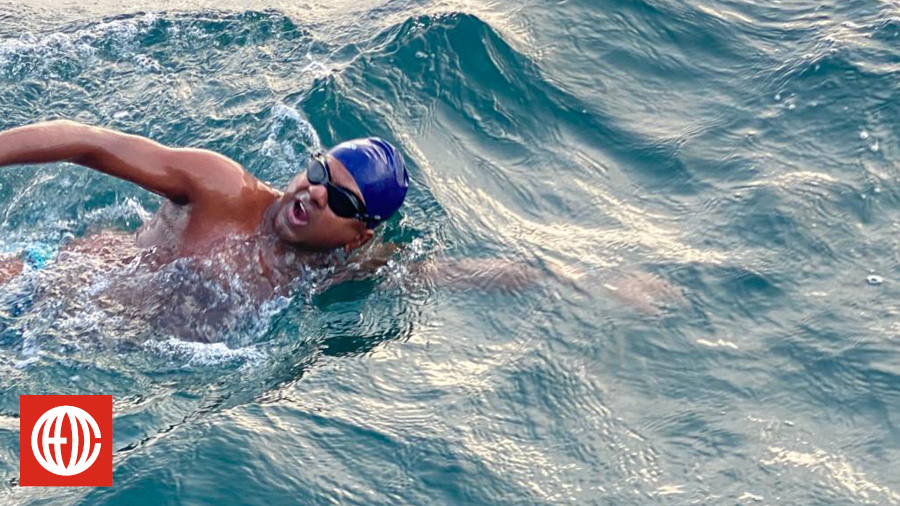
Guest: Siddhartha Agarwal, the founder of Bhoruka Park Pvt. Ltd, one of the leading commercial real estate developers in Bangalore, India.
Overview: Thinking BIG is a mindset that, with practice, coaching, and follow-through, can become a powerful habit. Apply the same systems and processes to your business that you apply to sports, hobbies, personal challenges, and relationships, and there’s no limit to what you can accomplish.
On today’s show, Siddhartha Agarwal discusses why he set a goal of swimming across the English Channel, how he worked with a coach and a partner on a year-long plan to achieve that goal, and what the whole process taught him about Making BIG Happen in both business and life.
Siddhartha Agarwal on the power of focus:
“Intuitively you want to do many things to grow your business. But when you start really focusing on the things that you’re good at, you will find new opportunities. In our case, we now have a pipeline for the next three to five years which is going to grow our company bigger than what we had imagined earlier when we were trying to do many different facets. COVID hit us really bad. We have a technology park where we had 500,000 square feet rented out to a single client and the client left after COVID hit. And so our revenue went down to zero. Suddenly our eyes opened and we said, ‘What can we do to fill the building up again?’ And so the first thing, of course, was have a runway where the finances are taken care of, where you pay your payroll, you maintain the building and all the company expenses. But after this focus came in, we realized that the building was not up to par. And so we created a big CapEx plan to upgrade the building. We found that, compared to all the buildings around us, we were the first ones to get filled up because clients coming in saw that we were maintaining a very good building. We were upgrading the building. And so they preferred that over going to older buildings around us. So sometimes it’s counterintuitive, but if you go with a lot of data and you go with conviction in what you have decided with the strategic plan, I find that pays off.”
Siddhartha Agarwal on setting BIG goals and planning to hit them:
“Why did I decide to swim the English Channel? Because you’ve got to have a very ambitious goal. I could go to my local swimming pool and swim there for an hour and say, that’s a goal. But I decided it’s got to be something so audacious that when you set it, it should actually make you nervous. There are about 750 people from India who have climbed and summited Mount Everest. And less than one fifth of that number have swam across the English Channel. And so my coach and my team decided, why don’t we set that as a goal? We were nervous while setting it. There was a good chance of failure. But once we set it, we said, ‘Now we have a year, let’s start working towards it.’ So it’s quite parallel to when you make a one-year plan in your company. There’s no difference. You set an audacious goal where you think you might fail, and then you plan it out.”
Siddhartha Agarwal on why hitting goals is 80% mental:
“Everyone would assume it’s all about getting ready physically to do an event like this. But you’d be surprised to know that the physical part is only 20%. You have to train physically, you have to learn how to swim efficiently. But once you get there, it actually is 80% mental. My only goal right now is to swim and get to the French shore. And so I must overcome all these distractions to get to my goal. At that point of time, if my mind says, ‘No, there are too many jellyfish and they’re going to sting me, I’m shivering, and I cannot handle this anymore,’ the captain will stop the swim. My own coach will stop the swim the minute I say I don’t want to swim anymore. So it is entirely your mind, 80%, that says, ‘That’s the goal. These are distractions. And you’re going to get over all the distractions to get to the goal.’ And I find it’s the same with business. Of course, distractions are going to be tough. They’re going to be challenging. And if they weren’t tough and they weren’t challenging, then the whole world would be doing what you’re doing. There’s no challenge to that. And if there’s no challenge, then there’s no business to it. So get over the distractions, focus on the goal.”
Links:
Siddhartha Agarwal on LinkedIn
IRONMAN Lessons for Business Success – CEO Coaching International’s Mark Moses reflects on how his preparation and execution on race day parallels the key traits of top business performers.
How Successful CEOs Conduct Annual Planning – Two of our top CEO coaches explain what happens before, during, and after an annual planning session.
About CEO Coaching International
CEO Coaching International works with CEOs and their leadership teams to achieve extraordinary results quarter after quarter, year after year. Known globally for its success in coaching growth-focused entrepreneurs to meaningful exits, CEO Coaching International has coached more than 1,000 CEOs and entrepreneurs in more than 60 countries and 45 industries. The coaches at CEO Coaching International are former CEOs, presidents, or executives who have made BIG happen. The firm’s coaches have led double-digit sales and profit growth in businesses ranging in size from startups to over $10 billion, and many are founders that have led their companies through successful eight, nine, and ten-figure exits. Companies working with CEO Coaching International for two years or more have experienced an average revenue CAGR of 31% (2.6X the U.S. average) and an average EBITDA CAGR of 52.3% (more than 5X the U.S. average).
Learn more about executive coaching | Meet our world-class coaches







